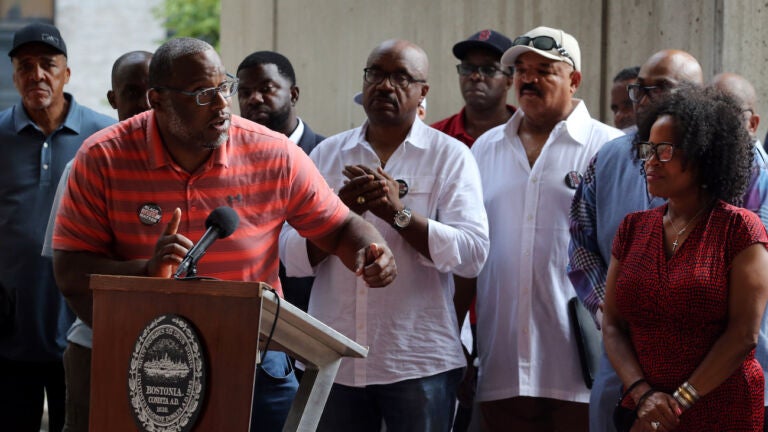"Brothers, our time has come."

Boston city councilors on Wednesday advanced the formation of a city commission to study and address issues specifically facing Boston’s Black men and boys, from education to violence.
The unanimous vote is the second attempt to get the group off the ground after an ordinance to form a similar commission received full council support in 2014 only to be upended by a veto from then-Mayor Marty Walsh.
“Since then, we have continued to see disproportionately impacted Black men and boys in all sectors, from education to health and wellness to economic empowerment to violence,” Councilor Julia Mejia, a lead sponsor, told councilors this week. “The need for this commission never went away, and neither did the advocates who have been pushing for this ordinance.”
Among them: Tito Jackson, an activist and former city councilor from Roxbury, who filed the initial ordinance years back.
In June, Jackson and other advocates announced the formation of the Boston Black Men’s Committee, a separate initiative focusing on a variety issues from economic inequality to voter engagement, ahead of the citywide elections this fall.
Getting a city commission up and running, however, is also a priority of that group.
On Twitter Wednesday, Jackson wrote that he had chills after learning the legislation passed again.
Brothers,” he wrote, “our time has come.”
Walsh, at the time of his veto, wrote that the commission would “duplicate and complicate efforts that my administration is already engaged in.” (Boston, under the Walsh administration, enrolled in then-President Barack Obama’s initiative, “My Brother’s Keeper,” which similarly seeks to close opportunity gaps faced by boys and young men of color.)
Walsh also said the commission violated the city charter.
Mejia said the amended ordinance passed on Wednesday addresses the charter issues outlined by Walsh, and builds upon the initial proposal from 2014 in that it allows the commission to hold community conversations on the topics it addresses.
According to Councilor Lydia Edwards, who chairs the Committee on Government Operations, other amendments ensure LGBTQ residents are involved in the commission “and also recognizes their own pathway as part of the Commission on Black Men and Boys.”
Under the ordinance, the mayor would make appointments to the 21-member commission, with seven members serving two-year terms, seven serving three-year terms, and seven serving four-year terms. Two members will be youth members.
The law spells out the charges before the commission, including designing projects and programs “that promote equity for Black men and boys;” working with city leaders regarding state and federal legislation and programs that impact Black men and boys; and “coordinating dialogues and action on behalf of city government to issues of concern to Black men and boys and related organizations, including but not limited to: concerns related to national
origin, sexual orientation and gender identity, mental, physical, and sexual health, violence prevention, employment, and more.”
For its first year, the commission would be required to hold monthly meetings and provide quarterly updates to the City Council.
The law now heads to acting Mayor Kim Janey’s desk.
“We spoke with the community and came to the agreement that this ordinance is doing everything possible to impact change on behalf of Black men and boys in the city,” Mejia said. “We have the opportunity to make history. This ordinance matters because Black men and boys matter.”
Read the ordinance:
[AMENDED COPY] an Ordinance Creating a Commission on Black Men and Boys. (3) by Christopher Gavin on Scribd
Newsletter Signup
Stay up to date on all the latest news from Boston.com
"again" - Google News
September 16, 2021 at 11:56PM
https://ift.tt/3Es7Fzq
Boston councilors again approve Commission on Black Men & Boys - Boston.com
"again" - Google News
https://ift.tt/2YsuQr6
https://ift.tt/2KUD1V2
Bagikan Berita Ini















0 Response to "Boston councilors again approve Commission on Black Men & Boys - Boston.com"
Post a Comment